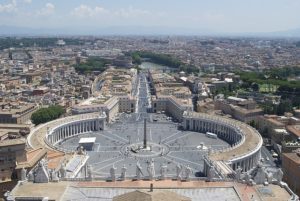July 13, 2019 • Life for Leaders
Keep these words that I am commanding you today in your heart… Talk about them when you are at home and when you are away, when you lie down and when you rise.
Deuteronomy 6:6, 7b
 Shortly after I became a Christian, I talked with some non-Christian friends and neighbors about my newfound faith. I was pleasantly surprised at their initial, positive response. They were genuinely delighted that I had found ultimate meaning and purpose for my life. But when I invited them to join me to hear more about my new discovery, they demurred. It seemed that, for them, faith was strictly a private matter of personal choice. They were happy for me that I had made a personal discovery of ultimate truth. However, for them that’s all it was – a personal discovery. It may have been ultimate truth, but only so for me. I came to realize they were not alone. It soon became clear that the secular world in which I live believes that religious truth is a private matter and has no material implications for public life.
Shortly after I became a Christian, I talked with some non-Christian friends and neighbors about my newfound faith. I was pleasantly surprised at their initial, positive response. They were genuinely delighted that I had found ultimate meaning and purpose for my life. But when I invited them to join me to hear more about my new discovery, they demurred. It seemed that, for them, faith was strictly a private matter of personal choice. They were happy for me that I had made a personal discovery of ultimate truth. However, for them that’s all it was – a personal discovery. It may have been ultimate truth, but only so for me. I came to realize they were not alone. It soon became clear that the secular world in which I live believes that religious truth is a private matter and has no material implications for public life.
That surprised me. Even in my early days as a follower of Jesus, I heard the gospel claim that Jesus is Lord of all of life. In the words of the text for today, the Greatest Commandment to love God with all our heart, soul, mind and strength, addresses us in every place and at all times: when you are at home and when you are away, when you lie down and when you rise.
What surprised me even more was that some of my Christian friends more or less agreed with my non-Christian neighbors. My Christian brothers and sisters agreed on the importance of evangelism, of course. But, the gospel that was preached focused primarily on a personal, “spiritual” encounter with Jesus. Jesus as Lord over all Creation was reduced to Jesus as Lord of my heart. The words “spiritual” and “private” became synonymous.
Much of my life as a follower of Jesus has been lived recovering the public dimension of the gospel. It has not been an easy journey, as many of you no doubt understand from your own experience as Christian leaders in both secular and religious contexts. There are plenty of painful examples of doing it poorly, both in the history of the church and in my own personal experience. The journey is complicated by the “now and not yet” dimension of our redemption. We give witness to Jesus as Lord in the midst of a deeply broken world. To use the language from one of the favorite Psalms of the early church as applied to Jesus’ current reign, “Rule in the midst of your foes.” (Psalm 110:2b) It would be a lot easier if all of Jesus’ enemies, including sin and death, had already been fully vanquished!
Still, our task is to give witness to Jesus as Lord in the midst of the public square. As today’s text reminds us, despite our track record, abandoning the public arena is not an option for faithful disciples. In the context of each of our leadership responsibilities there is a public dimension to our faith. How are we to live it out?
I know of no easy answers. But, today’s text may give us some hints. First, simply reclaiming the public dimension of the gospel is a good start. Confessing Jesus as Lord of all, and not just as Lord of our hearts and lives, is a necessary beginning and a helpful daily discipline. Second, as Jesus reminds us, we are right to begin with our hearts. Jesus taught often about how important it is for us to not make a show of our spirituality. We should begin “at home” and when we “lie down”. In other words, we are to pray, first and foremost, “in secret.” (Matthew 6:5-6) As the Psalms and our wisest spiritual guides remind us, in those times we need to pray all and everything that is within us. Nothing in us is unprayable. In particular, we need to pray who we are and not who we wish we were. Finally, we need to learn to have ordinary conversations about (to “talk about”) what it means to live out this all-encompassing love for God in our public lives. In other words, we need to develop a learning community of people around us with whom we can wrestle through how to live this out in practice.
The same Jesus who commands us to pray in secret also commands us to “let your light shine before others, so that they may see your good works and give glory to your Father in heaven.” (Matthew 5:16) In every place and at all times, the Greatest Commandment reminds us that Jesus is Lord and that we are to be his faithful witnesses. And, that means in public as well as in private.
Something to Think About:
Do you see faith as primarily a personal and/or private matter? Why or why not? How does your work context treat religious faith?
What does the Lordship of Jesus mean to you in the context of your work?
With whom can you talk about the implications of Jesus’ Lordship for your leadership work?
Prayer:
Lord Jesus Christ, forgive us for reducing your Lordship to a mere personal and private matter. We confess that you are Lord, not only of our hearts, but also of all things visible and invisible, public and private, including all that we are and have.
Help us to live in such a way that our private and public lives honor you and your rule. Grant us both insight and virtue to follow you.
We ask in your name, Amen.
Explore more at the Theology of Work Project online commentary: Give Us This Day Our Daily Bread (Matthew 6:11)

During his adult life, Uli Chi has lived and worked in the intersection between business, the academy and the church. He has had the privilege of serving as past Board Chair of Regent College in Vancouver, BC, as current Vice Chair of the Board of the Max De Pree Leadership Center at Fuller Seminary, and as current Chair of the Executive Committee of the Center for Integrity in Business at Seattle Pacific University. He has also been involved in all aspects of local church leadership, including as a member of the adult ministries team’s teaching faculty at John Knox Presbyterian Church in Seattle.
Click here to view Uli’s profile.





Does Jesus love me as he loves himself? He died for me.
Could the Greatest Commandments be so great; that possibly even God could not do anything greater?
Here is a childlike and yet profound way to test the power of the greatest commandments; when looking for one single purpose for the creation of the universe and life.
Before the creation of the universe began, imagine God the Father, Son and Holy spirit looking out into the vast empty void of space. They are thinking, we have the power to create anything we want, what is the greatest good thing that we can create?
God could create all the stars and planets and be the supreme builder. He could create plants; and be the unsurpassed gardener. God could create the animal kingdom; and be the best farmer. God could create children in his own image and be the greatest father. Can God create anything greater than children in his own image?
God could love each and everyone of his children as he loves himself. Could God love us more than he loves himself?
Could there be any greater purpose for God to create the universe and life?
We cannot love God as we love ourselves, because that would bring God down to our level, so we have the greatest commandment to love God with all our heart, soul, mind and strength. If God loves everyone as he loves himself, we are given the second greatest commandment to do likewise.
Did the greatest commandments have a greatest meaning for God first, before he gave them to us?
Why did God say these commandments are the greatest?
In a way, God loves us more than he loves himself, because he was willing to do what was good for us but not good for him (send his Son to die). In a sort of contradicting way, God loves himself more than us, because he knows that he is the greatest being in the universe and retains the power of heaven or hell over us.
We can marvel at the great attention to detail that is evident in everything from the microscopic cells of life and right up to the giant structures of galaxies. Can you find any greater purpose for all this to exist? Challenge the above statements in your mind in an honest way, test them against any religious beliefs, and test them against any form of logic.
This is just a collection of words to challenge the mind to think. Search for something greater.
Blessings
Eric